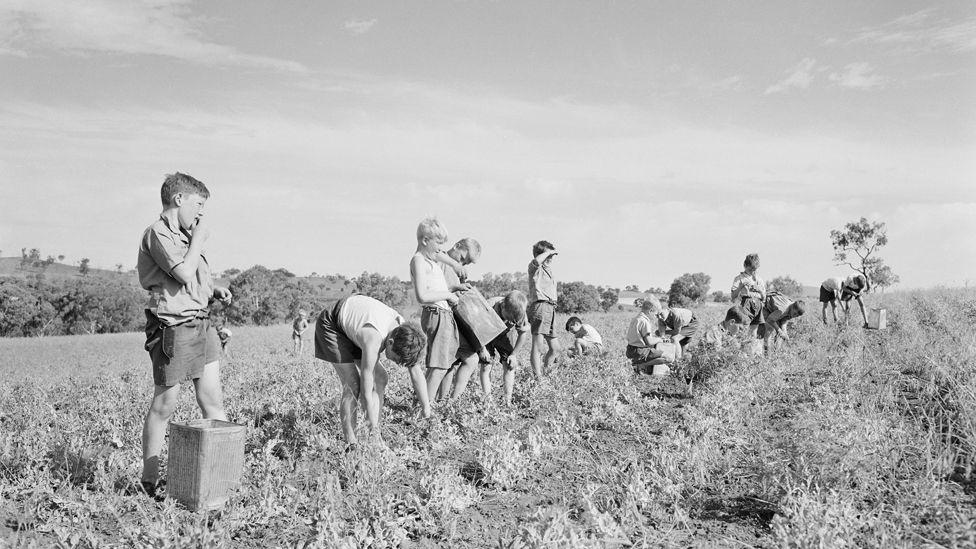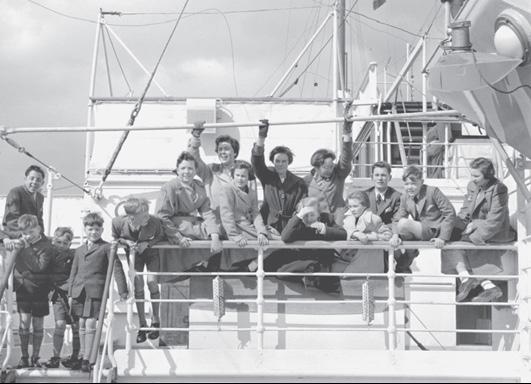
4 minute read
The good old days
from Portfolio
by Paul Kelly
You are going to do an oral history interview and write a report for an exhibition.
1 Which of these important events do you remember? In pairs, tell each other what you remember about some of them. losing a tooth · an exciting day trip · learning to ride a bike · first best friend · a fun sleepover
Advertisement
2 Listen to part of an interview about an important event in Jack’s life. Jack is in his eighties. What was the event? What was unusual about it?
3 Listen again. Complete the past simple questions that Amy asks.
1. When __________ you born?
2. I see, and where __________ you live?
3. So, why did you __________ to Australia?
4. And __________ did your mum think?
5. __________ you see here again?
4 Read the questions in exercise 4 again. Then, complete the rules for past simple questions.
We use when / where + was / __________ + subject + born to ask about a person / people’s date or place of birth. We use (a question word +) __________ + subject + __________ to make past simple questions.
LANGUAGE TOOLBOX GRAMMAR theory and practice
5 Work in pairs. Prepare four past simple questions to ask your partner about their first day at primary school.
A trip to remember
I interviewed a neighbour, Jack Bayliff, about his memories of his childhood. Jack was born in Birmingham in 1941. His dad died in the Second World War. His mother didn’t have enough money to look after him and his two sisters, so she sent them to an institution for poor children in 1946.
The institution promised to look after them, but a year later it sent them to Australia to work on farms. The institution told Jack and his sisters that their mother was dead, while they told Jack’s mother that the children were with a good family in England.
Jack and his sisters travelled on the ship Asturias for six weeks and arrived in Fremantle, Australia in September 1947. In Australia, they separated Jack and his sisters and took everything from them, including mementos of home. Jack went to a farm school, while his sisters worked as servants and did domestic chores all day on other farms. Jack didn’t see them again for ten years.

Until he was 14, Jack used to go to school in the morning. In the afternoon, he was supposed to learn a trade on the farm, but he just did the same boring physical tasks every day. The work was extremely hard, and the staff used to frequently hit the boys so at 16 Jack ran away.

Jack looked for his sisters and after many difficulties, he finally found them. They were still all homesick and wanted to return to England. They worked to save enough money to go home and after twelve years away, they went back and discovered that their mother was still alive.
6 In pairs, ask and answer the questions. What are the differences and similarities in your answers?
7 Read the report that Amy wrote about her interview with Jack. Think of five adjectives to describe Jack and his sisters’ possible feelings about their experience.
8
Use words from the report to find more information, photos or videos about the British children that were sent to Australia and other countries. Share it with the class. Jack Bayliff’s experiences are real, but his name is false.
9 Answer the questions about the highlighted words in the report.
1. Which word talks about an organization that looks after a particular group of people?
2. Which three words refer to connections with the past?
3. Which word do we use to talk about a period of our lives?
4. Which five words talk about to work?
LANGUAGE TOOLBOX VOCABULARY practice
10 Read the information about used to and find two examples of the structure in the report. How do you think we write the negative and question forms of used to?
We can use used to to talk about something that happened frequently in the past but doesn’t happen now.
LANGUAGE TOOLBOX GRAMMAR theory and practice
11 You are going to do an oral history interview and then write a report. Who could you interview about an important childhood experience?
12 Prepare some questions for an oral history interview. Use the ideas below to help you think of a topic. family life · first work experience · free time activities · growing up · hometown · important events · leaving home · local traditions
13 Listen to the advice for doing an oral history interview. Complete the sentences with one or two words in each gap.

Oral history
Oral history involves interviewing people so that we can record their memories. Doing a successful oral history interview.
Who and what. Identify someone who will talk about an important childhood experience in their lives and ask for their 1) __________ to interview and record them. Explain what you’ll do with the 2) __________.
Preparation. Prepare 3) __________, a few general questions and a set of 4) __________ questions on the topic. Also be ready to 5) __________ questions.
Before the interview. Check your recording equipment and place it where it can easily record 6) __________.
The interview. Be an 7) __________ and ask follow-up questions.
After the interview. Finish by thanking the person. Then, save the recording and 8) __________ it later.
14 Do the interview. If the person speaks English, ask them to do the interview in English. If not, translate your questions from exercise 12 and do the interview in your language.
15 Use the information from the interview to write a report about the person’s experience. Follow the advice below:
* Only include the information that is connected to the topic that you want to talk about.
* Include the person’s ideas, but don’t try to translate their exact words. All languages have words and expressions that are difficult to translate.
* Give information about traditional celebrations, local places etc. that the person mentions. Your readers might not share your culture.
* Organise your work into clear paragraphs. LANGUAGE TOOLBOX WRITING guide
16 Add your report to the class exhibition. Include any photos that the person who you interviewed gave you or find photos from the period online.
17 Evaluation
* Which report(s) interest(s) you the most? Why?









